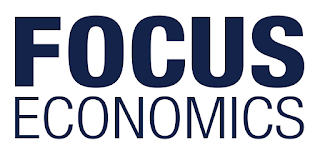LatinFocus
December 04, 2019
Argentina:
The economy most likely slid back into recession in the third quarter and seems to be performing poorly in the fourth quarter. Economic activity slumped in August due to the financial turbulence which followed the unexpectedly large victory of Alberto Fernández in the primary elections and remained mired in contraction in September. While the external sector probably cushioned the downturn somewhat in Q3 and continued to support growth in October, abysmal consumer confidence in October− November spells trouble for the last quarter of the year. Meanwhile, in mid-November, President-elect Alberto Fernández met Kristalina Georgieva, the new head of the IMF. Although Georgieva expressed the Fund’s willingness to engage with the new government, Fernández has so far remained elusive as to how he will address Argentina’s sizable debt burden, stoking anxiety among investors.
Brazil:
Recent data suggests that the economy is gaining gradual steam, albeit from a subdued level. Data for September revealed a positive end to Q3 for the domestic economy, with economic activity and retail sales both jumping. Moreover, incoming data for Q4 points to broadly sustained momentum, with the manufacturing PMI staying in expansionary territory for the third consecutive month in October and business confidence edging up in November. That said, the external sector continues to remain under pressure amid evaporated demand from Argentina and subdued exports to China; exports recorded the largest drop since January 2016 in October. Meanwhile, on the political front, the government presented a slew of reform proposals in November, aimed at cutting government spending to reduce the bloated fiscal deficit. If approved, the measures should help reduce non-discretionary spending, although doubts over the proposed timeline remain given Brazil’s slow political system.
Chile:
The economy is in the midst of a rocky fourth quarter as President Sebastian Piñera’s efforts to quell the protests that have engulfed the country since mid-October have so far proved unsuccessful. Amid the upheaval, the government proposed a rewriting of the constitution, while Congress approved a revised 2020 budget that ramps up public expenditure on pensions, healthcare and transport, and is projected to push the fiscal deficit to 2.9% of GDP from a previously planned 2.0% of GDP. Although this should provide a temporary boost to private consumption, it is not clear if higher public expenditure alone will defuse the protests, while business confidence could be hit by heightened uncertainties surrounding a new constitution. Available data since the start of the turbulence has been bleak, with economic activity contracting for the first time in two and a half years in October. This markedly contrasts the third quarter’s expansion, which saw the economy growing at the fastest pace of the year thanks to blistering fixed investment growth and a rebound in exports.
Colombia:
Growth accelerated to a four-year high in the third quarter, contrasting the Q2’s slowdown. Robust domestic demand drove Q3’s expansion. Household spending rose at a faster clip compared to Q2 on the back of sturdy remittance inflows and credit growth, rising real wages and migration inflows from Venezuela. Moreover, fixed investment growth quickened in Q3 amid buoyant business sentiment and VAT deductions on investment in machinery and equipment. That said, the external sector dragged on overall growth in Q3 as export growth lost pace while imports surged. Meanwhile, Colombians have taken to the streets recently in widespread anti-government protests. The protests have quickly turned violent, while meetings between President Duque and protest leaders have failed to produce any breakthrough. Duque has promised to hold a national dialogue with all social stakeholders to address these issues; however, this has so far been met with skepticism.
Venezuela:
Oil production climbed modestly in October following three months of decline, but was still down more than 40% since the beginning of the year and at the lowest levels for several decades. A raft of U.S. sanctions and major power outages have choked the oil industry, while plunging exports have led to severe shortages in U.S. dollars needed to pay for imports. With sanctions making it near impossible to purchase vital supplies for the oil sector, the country has been forced to sell cheaper blends of petroleum at a cut price. In late November, the government reportedly proposed paying suppliers and contractors in yuan in a bid to circumvent sanctions. Moreover, the government inaugurated the country’s first gold extraction and processing complex on 25 November, which will transform gold ore into sellable gold bars without having to rely on expensive foreign assistance. Meanwhile, the opposition struck a deal to prevent bondholders from seizing PDVSA’s U.S. refining unit Citgo, the country’s most valuable overseas asset, until at least May next year


